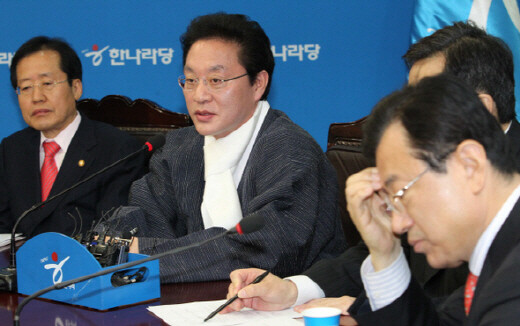hankyoreh
Links to other country sites 다른 나라 사이트 링크
Irregular worker issue attached to social welfare debate

Lee Jung-ae
The parliamentary debate over social welfare is now showing signs of expanding into labor issues, including the issue of irregular workers.
With the number of irregular workers ranging from 5.7 million (33 percent of the salaried work force) according to the Statistics Korea to 8.6 million (50.4 percent of the salaried workforce) according to the Korea Labor Institute, the belief is spreading that the irregular worker issue is one affecting a large part of society. There are calls coming from the National Assembly that the resolution of the issue of irregular workers, a cause of social polarization and one of its biggest victims, is itself welfare.
It seems the opposition parties, including the Democratic Party, which announced support universal welfare, are the first to take up the issue of irregular workers. Democratic Party leader Sohn Hak-kyu said in a radio address Jan. 18 that resolving labor issues, including irregular workers and low wages, was a core task of “universal welfare,” and during a party Supreme Council meeting Monday, he said the simultaneous handling of education, labor rights and welfare was a characteristic of the “creative welfare state” the Democratic Party favored. An aide explained that Sohn thinks for the welfare state to continue, it needs a core group of support, and that group can only be laborers.
Democratic Party Supreme Council member Chung Dong-young, who started calls for expanding welfare by introducing a tax on the wealthy, has recently been taking on labor issues in earnest, moving to the Environment and Labor Committee and seeking the advice of Korea Labour and Society Institute Director Kim Yu-seon.
An aide said, “Chung believes that without resolving the polarization of workplaces and the irregular worker issue, it will be difficult for the opposition to take power in 2012. He said Chung would continue to expand exchanges with labor.”
On Jan 27, the minor opposition Democratic Labor Party (DLP) and People Participation’s Party (PPP) held a joint debate to find a joint solution to irregular worker issues. This was a notable event in the continuation of the discussion over the irregular worker issue.
The ruling Grand National Party (GNP) is still focusing on things like deregulation as part of its principle, “job creation as the best form of welfare,” as stated during GNP Chairman Ahn Sang-soo’s New Year’s speech. Amid this atmosphere, GNP Supreme Council member Chung Doo-un has recently begun to bring up actively the issue of irregular workers.
During a council meeting Monday, Chung said, “The most serious welfare issue is that of irregular workers.” Chung also said, “It is hypocritical to talk about welfare issues while ignoring the problem of irregular workers.”
Chung, who gave as New Year’s gifts to acquaintances copies of his two books, “The Welfare State” and “Irregular Workers Who Have Lost Their Rights,” recently told reporters that a bill was drafted in 2006 to address issues with irregular workers, but their problems have continued to grow worse. Chung also said he was thinking about amending the Labor Law, which is predicated on regular workers.
Within the Grand National Party, however, there is also concern about connecting labor issues to the welfare debate.
“The debate could turn into one of political parties promising policies that make them seem caring to win the votes of the up to 8 million irregular workers prior to next year’s general and presidential elections,” said Lawmaker Hyun Ki-whan, a veteran of the Federation of Korea Trade Unions (FKTU). “The irregular worker issue is separate from the welfare issue, and it should be approached as a matter of workplace employment form.”
Please direct questions or comments to [englishhani@hani.co.kr]
Editorial・opinion
![[Column] Park Geun-hye déjà vu in Yoon Suk-yeol [Column] Park Geun-hye déjà vu in Yoon Suk-yeol](https://flexible.img.hani.co.kr/flexible/normal/500/300/imgdb/original/2024/0424/651713945113788.jpg) [Column] Park Geun-hye déjà vu in Yoon Suk-yeol
[Column] Park Geun-hye déjà vu in Yoon Suk-yeol![[Editorial] New weight of N. Korea’s nuclear threats makes dialogue all the more urgent [Editorial] New weight of N. Korea’s nuclear threats makes dialogue all the more urgent](https://flexible.img.hani.co.kr/flexible/normal/500/300/imgdb/original/2024/0424/7317139454662664.jpg) [Editorial] New weight of N. Korea’s nuclear threats makes dialogue all the more urgent
[Editorial] New weight of N. Korea’s nuclear threats makes dialogue all the more urgent- [Guest essay] The real reason Korea’s new right wants to dub Rhee a founding father
- [Column] ‘Choson’: Is it time we start referring to N. Korea in its own terms?
- [Editorial] Japan’s rewriting of history with Korea has gone too far
- [Column] The president’s questionable capacity for dialogue
- [Column] Are chaebol firms just pizza pies for families to divvy up as they please?
- [Column] Has Korea, too, crossed the Rubicon on China?
- [Correspondent’s column] In Japan’s alliance with US, echoes of its past alliances with UK
- [Editorial] Does Yoon think the Korean public is wrong?
Most viewed articles
- 1[Column] Park Geun-hye déjà vu in Yoon Suk-yeol
- 2Why Korea shouldn’t welcome Japan’s newly beefed up defense cooperation with US
- 3[Guest essay] The real reason Korea’s new right wants to dub Rhee a founding father
- 4Will NewJeans end up collateral damage in internal feud at K-pop juggernaut Hybe?
- 5Thursday to mark start of resignations by senior doctors amid standoff with government
- 6N. Korean hackers breached 10 defense contractors in South for months, police say
- 7[Column] ‘Choson’: Is it time we start referring to N. Korea in its own terms?
- 8Kim Jong-un expressed ‘satisfaction’ with nuclear counterstrike drill directed at South
- 9[Editorial] New weight of N. Korea’s nuclear threats makes dialogue all the more urgent
- 10Senior doctors cut hours, prepare to resign as government refuses to scrap medical reform plan